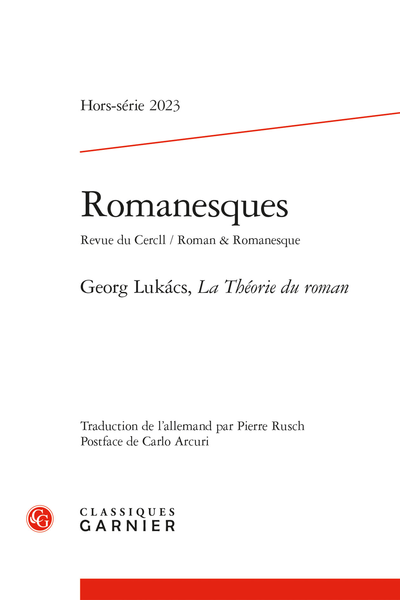
Résumés
- Type de publication : Article de revue
- Revue : Romanesques hors-série
2023. Georg Lukács, La Théorie du roman - Pages : 161 à 162
- Revue : Romanesques
- Thème CLIL : 4027 -- SCIENCES HUMAINES ET SOCIALES, LETTRES -- Lettres et Sciences du langage -- Lettres -- Etudes littéraires générales et thématiques
- EAN : 9782406170075
- ISBN : 978-2-406-17007-5
- ISSN : 2271-7242
- DOI : 10.48611/isbn.978-2-406-17007-5.p.0161
- Éditeur : Classiques Garnier
- Mise en ligne : 07/05/2024
- Périodicité : Semestrielle
- Langues : Français, Anglais
Résumés/Abstracts
Christophe Reffait, « Note éditoriale »
La nouvelle traduction de La Théorie du roman par Pierre Rusch que nous proposons dans ce numéro est à remettre dans le fil des publications précédentes de la revue en rapport avec les études lukácsiennes : d’abord le numéro 8 de Romanesques de 2016, pour le centenaire de la première publication de La Théorie du roman ; ensuite l’ancien numéro 4 de Romanesques sur la notion de « romance », qui contenait déjà la traduction d’inédits de Lukács.
Mots-clés : Georg Lukács, Théorie du roman, traduction, critique, littérature.
Christophe Reffait, “Editorial Note”
In this issue we present Pierre Rusch ’ s new French translation of The Theory of the Novel , continuing in the vein of previous editions of the journal focusing on Lukács ’ s work: first, issue eight of Romanesques from 2016, marking the centenary of The Theory of the Novel ’ s publication; then issue four, exploring the notion of “romance” and containing translations of previously unpublished work by Lukács.
Keywords: Georg Lukács, The Theory of the Novel , translation, critic, literature.
Georg Lukács, traduction Pierre Rusch, « La Théorie du roman »
La Théorie du Roman (1916) fait partie des œuvres de la période pré-marxiste de Georg Lukács. Elle articule une analyse philosophique des genres littéraires avec une philosophie de l’histoire d’inspiration hégélienne. Fin connaisseur de l’histoire de la littérature, Lukács établit un diagnostic de son temps selon une méthode qui nourrira notamment les travaux de l’École de Francfort. Les limites d’une précédente traduction française (1963) appelaient une nouvelle version, plus conforme à l’original.
Mots-clés : épopée, roman, philosophie de l’histoire, désenchantement, utopie.
162Georg Lukács, French translation by Pierre Rusch, “The Theory of the Novel”
The Theory of the Novel (1916) is a work that belongs to Georg Lukács ’ s pre-Marxist period. It combines a philosophical analysis of literary genres with a philosophy of history inspired by Hegelian ideas. Displaying a great knowledge of the history of literature, Lukács analyzed his era using a method that would notably influence the works of the Frankfurt School. The limitations of a previous French translation (1963) called for a new version, more faithful to the original work.
Keywords: epic, novel, philosophy of history, disenchantment, utopia.
Carlo Arcuri, « Le roman est-il nécessaire ? »
La pensée philosophique du jeune Lukács – messianisme juif, kantisme, hégélianisme – contribue à faire de La Théorie du roman, écrite pendant la première guerre mondiale, une clé eschatologique pour comprendre le roman et le genre destiné, d’après Lukács, à le « déposer » par un retour en force : la forme rénovée de l’épos. Mettre en valeur cet arrière-plan philosophique et esthétique, ayant trait notamment à la théorie des genres littéraires, justifie une nouvelle traduction de cette œuvre.
Mots-clés : roman, épos, marxisme, hégélianisme, Aufhebung (« sursomption »), kantisme, Kierkegaard.
Carlo Arcuri, “Is the novel necessary?”
The philosophical thought of the young Lukács–Jewish messianism, Kantianism, Hegelianism–help to make The Theory of the Novel, written during the First World War, an eschatological key to understanding the novel and the genre destined, according to Lukács, to “depose” it by making a strong resurgence: epos in its renewed form. The interest of highlighting this philosophical and aesthetic background, particularly with regard to the theory of literary genres, justifies a new translation of this work.
Keywords: novel, epos , Marxism, Hegelianism, Aufhebung (“sublation”), Kantianism, Kierkegaard.